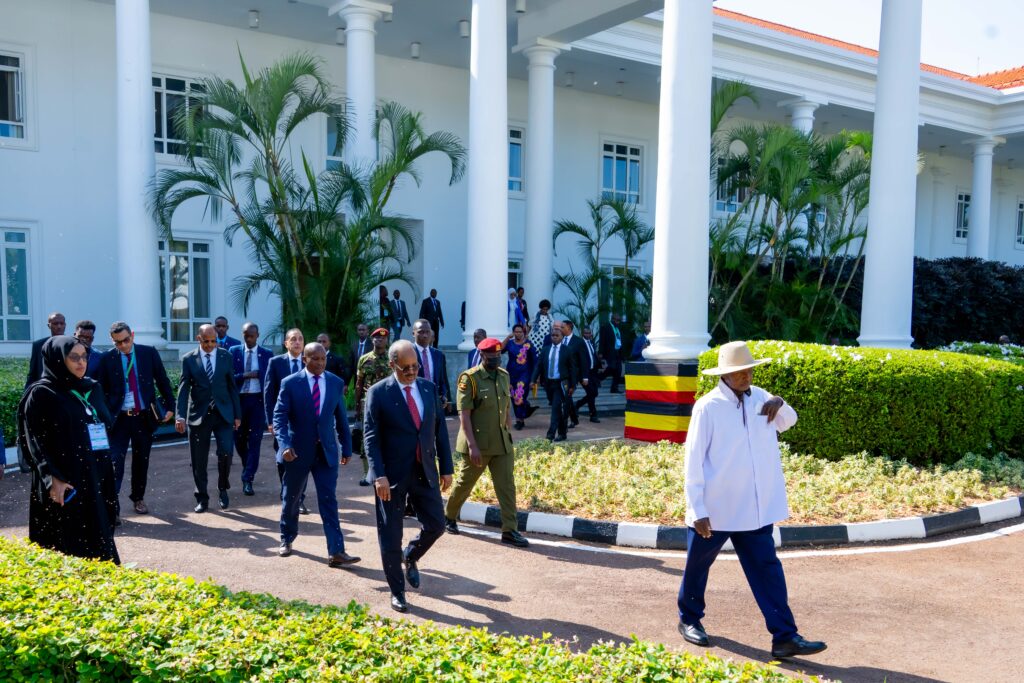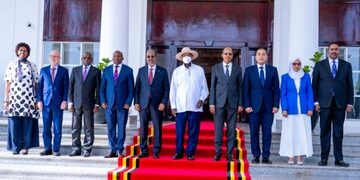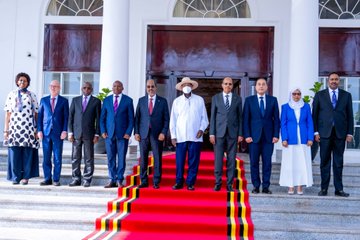President Yoweri Kaguta Museveni has emphasised the urgent need for greater African unity and increased financial support to Somalia, calling it essential for lasting peace and stability in the Horn of Africa.
Chairing the Extraordinary Summit of Troop-Contributing Countries (TCCs) to the African Union Support and Stabilisation Mission in Somalia (AUSSOM) at State House, Entebbe, President Museveni addressed a high-level gathering of African leaders and representatives. The summit focused on Somalia’s security transition, the future of the African Union’s mission, and broader regional efforts to combat terrorism and restore stability.
“We must help Somalia overcome its challenges. As we have heard today, additional funding is vital to sustain the stabilisation mission,” President Museveni urged, calling for African states and partners to intensify their support for Somalia’s peacebuilding efforts.
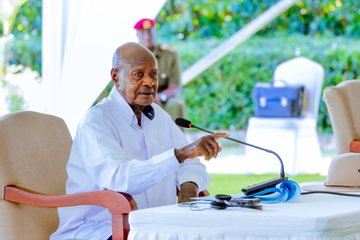
Drawing from Uganda’s historical struggles, Museveni invoked the spirit of Pan-African solidarity that aided Uganda during the battle against Idi Amin. “Solidarity is what brought Africa to where it is today. When Uganda faced the tyranny of Idi Amin, our brothers from Tanzania and Mozambique stood with us,” he noted.
The President also revisited the ideological foundations that guided Uganda’s recovery and development, stressing the National Resistance Movement’s (NRM) four pillars: Patriotism, Pan-Africanism, Socio-Economic Transformation, and Democracy. He warned against the politics of identity and sectarianism, calling them dangerous distractions that could undermine Africa’s progress.
“If I engaged in identity politics as a Munyankore, I would end up being an enemy of my people before becoming an enemy of Uganda,” he remarked, emphasising that Uganda’s prosperity is rooted in the interdependence of its diverse communities.
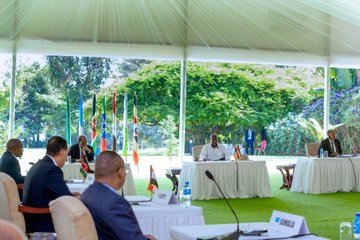
Reflecting on Uganda’s journey from a collapsed state between 1966 and 1986 to a stable nation, Museveni argued that Somalia could adopt a similar model grounded in ideological clarity and people-centred governance.
On Somalia’s current challenges, President Museveni criticised the chronic underfunding of both the Somali National Army and the African Union mission, describing it as an “underdose” that has prolonged instability. “Al-Shabaab is not a strong force. Their continued existence is a result of a small, poorly supported Somali army and insufficient external support,” he said.
He proposed the formation of a volunteer-based Somali national army, inspired by Uganda’s experience during its liberation struggle, where 9,000 troops were raised from 28 trained cadres between December 1978 and April 1979, fueled by ideology and volunteerism rather than salaries.
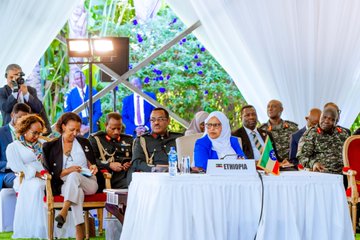
“Somalia and its supporters must stop the underdosing. We need enough, well-trained, and properly equipped Somali soldiers, or sufficient external forces. With adequate funding, Uganda is ready to contribute more troops,” he pledged.
President Museveni also expressed gratitude to all summit participants for their enduring commitment to African unity, peace, and development.
Somalia’s President Commends Support, Urges Renewed Commitment
In his remarks, H.E. Hassan Sheikh Mohamud, President of the Federal Republic of Somalia, extended deep appreciation to President Museveni and the Ugandan people for their hospitality and steadfast support.
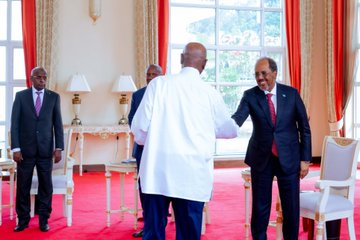
“I thank President Museveni for the warm welcome and extend my heartfelt gratitude to the troop-contributing countries for their unwavering commitment to Somalia’s stabilisation,” President Mohamud said.
He praised the collective success in combating Al-Shabaab, while cautioning that much work remains. “Together, we have made significant gains. The sacrifices made are not in vain. The support we have received — from humanitarian aid to training our forces — has been critical to saving lives and restoring hope in Somalia,” he emphasised.
President Mohamud highlighted Somalia’s political progress, noting improved dialogue among member states and consensus on key national matters, including security structures and an electoral model involving over five million participants — a milestone towards democracy.
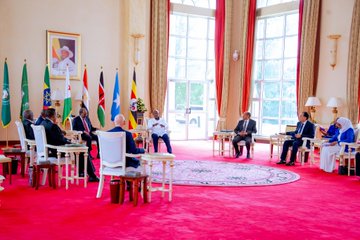
However, he warned that Somalia’s fight against Al-Shabaab is at a critical juncture, calling for renewed international and regional commitment, particularly to strengthen and sustain Somali national security forces.
“We must now agree on a clear financing roadmap to maintain our momentum. Somalia remains committed to working closely with all partners to implement strategic security frameworks and defeat terrorism,” he added.
The Somali leader also pledged full cooperation with the Contact Group on the Somali Transition (CGST), chaired by President Museveni, to support Somalia’s Security and Development Blueprint (SSADB).
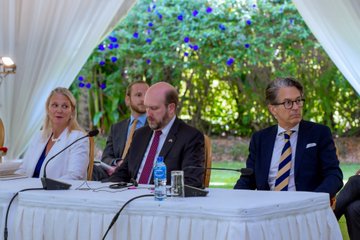
African Union Commission Reaffirms Support
The Chairperson of the African Union Commission, H.E. Mahmoud Ali Youssouf, expressed his profound appreciation for President Museveni’s hospitality and leadership.
“On behalf of the African Union Commission, I thank President Museveni and the Ugandan people for their gracious welcome,” he said, paying tribute to the bravery and sacrifices of all forces in Somalia.
While recognising the substantial progress achieved, H.E. Youssouf emphasised the ongoing threat posed by terrorist groups and urged accelerated development of the Somali National Army. “Strengthening Somalia’s security forces is crucial to securing the country’s future peace and stability,” he asserted.
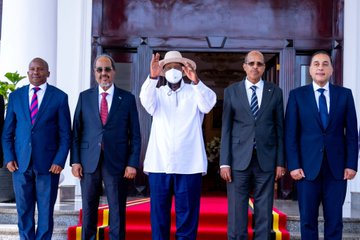
He also acknowledged Somalia’s financial constraints, reaffirming the African Union’s commitment to working with international partners to support Somalia’s recovery. “Our collective commitment remains vital as we continue supporting Somalia’s journey toward peace and development,” he concluded.
The Extraordinary Summit was also attended by several distinguished leaders, including H.E. Abdoulkader Kamil Mohamed, Prime Minister of the Republic of Djibouti; H.E. Prof. Kithure Kindiki, Deputy President of the Republic of Kenya; H.E. Dr. Mostafa Madbouly, Prime Minister of Egypt; H.E. Eng. Aisha Mohammed Mussa, Minister of Defence of the Federal Democratic Republic of Ethiopia and Dr. Workneh Gebeyehu, Executive Secretary of the Intergovernmental Authority on Development (IGAD), among others.
